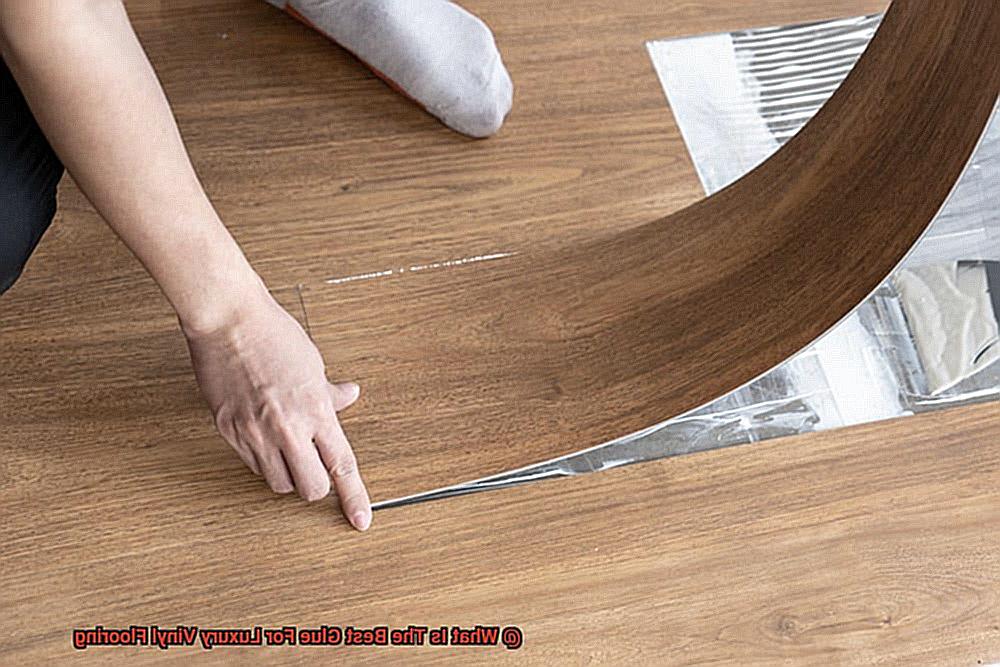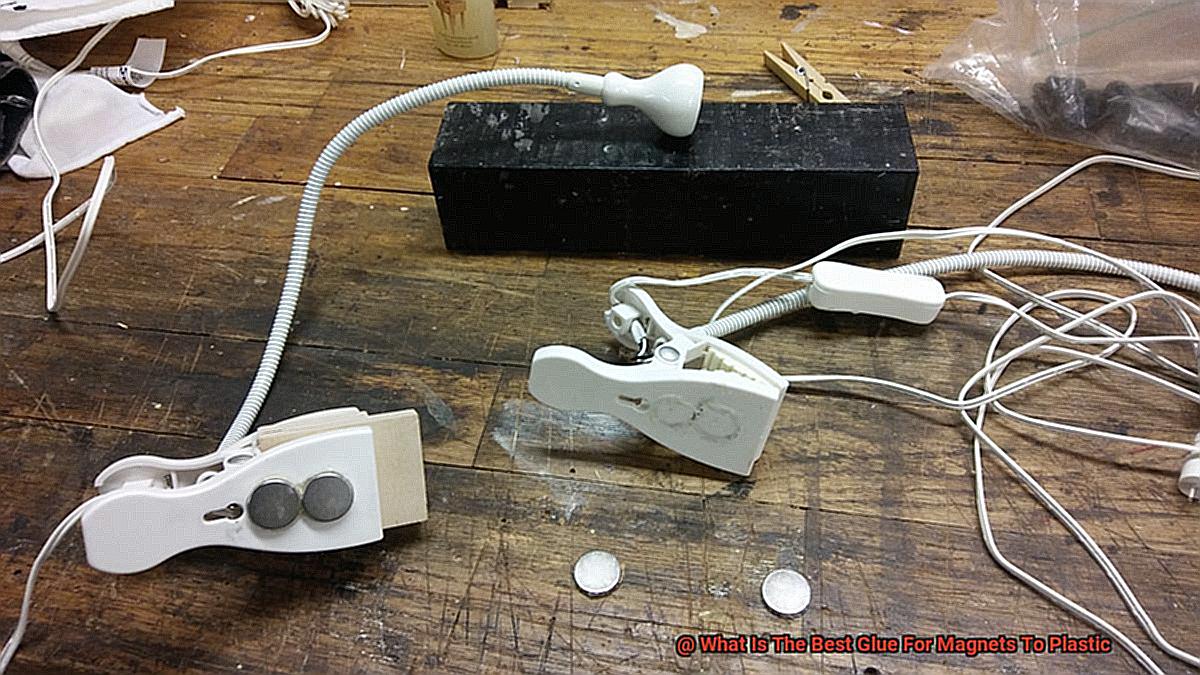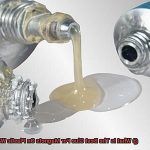Ever been enchanted by the mesmerizing power of magnets? These tiny wonders have held us spellbound for ages, from keeping our precious memories on the fridge to fueling cutting-edge technologies. But what happens when you want to securely attach a magnet to a plastic surface? Fear not. We’ve got just the solution in the realm of glues.
In this thrilling journey into the depths of magnets and adhesives, we’ll embark on a quest to find the absolute best glue for bonding magnets to plastic. Imagine this: you’ve got a groundbreaking project in mind, where two extraordinary forces—magnets and plastic—must join forces seamlessly. And guess what? The glue holds the key to your success.
Bid farewell to weak bonds and unreliable adhesives as we dive deep into the science behind it all. We’ll uncover the essential characteristics and properties that truly make a glue stand out for this specific task. Will it be flexibility that saves the day? Or perhaps its ability to withstand extreme temperatures or pass the acid test of time?

Join us as we explore an array of contenders vying for the crown of best glue for magnets and plastic. From timeless classics to groundbreaking innovations, even unexpected dark horses in the adhesive world will be revealed. Equipped with knowledge, we’ll shed light on crucial factors you must consider when selecting that one glue that guarantees an unbreakable bond.
So get ready for a magnetic adventure like no other as we unravel mysteries and unearth the ultimate glue for magnets and plastic. Brace yourself for an enthralling exploration where science and innovation unite these extraordinary forces in perfect harmony.
Different Adhesive Options for Bonding Magnets to Plastic
Contents
- 1 Different Adhesive Options for Bonding Magnets to Plastic
- 2 Epoxy Resin: Advantages and Disadvantages
- 2.1 Unbreakable Connection: The Mighty Bond
- 2.2 A Match Made in Adhesive Heaven: Versatility at Its Finest
- 2.3 Fearless Against Extreme Conditions: Conquering Temperature Challenges
- 2.4 Durability That Stands the Test of Time: Chemical Resistance Triumphs
- 2.5 Patience is Key: Mixing and Curing Time Demands Attention
- 2.6 Handle with Care: Potential Toxicity Lurks
- 3 Cyanoacrylate (Super Glue): Advantages and Disadvantages
- 4 Specialized Glues for Specific Plastics
- 5 Silicone-Based Adhesives: Pros and Cons
- 6 Hot Melt Glue Sticks: Pros and Cons
- 7 Factors to Consider When Choosing a Glue for Magnets to Plastic
- 8 Conclusion
Embarking on the journey of bonding magnets to plastic requires a deep understanding of adhesive options. With a plethora of choices at your disposal, selecting the perfect adhesive becomes an art. This captivating guide will navigate you through the diverse world of adhesives, shedding light on their unique attributes and suitability for different magnet and plastic materials.
Epoxy Resin: The Bonding Powerhouse

Epoxy resin reigns supreme as a favorite choice for bonding magnets to plastic, boasting unparalleled strength and durability. This two-part adhesive, specifically designed for magnet-to-plastic bonding, delivers an unyielding and everlasting bond. Its reliability lies in its ability to adhere flawlessly to both plastic and magnet surfaces.
Cyanoacrylate (Super Glue): The Speed Demon
Known by its alias, super glue, cyanoacrylate adhesives excel in rapid bonding and tenacity. These adhesives work harmoniously with most plastics but demand immaculate surface conditions devoid of oils or contaminants that could impede their adhesive prowess. Super glue is an ideal option when time is of the essence, but meticulous surface preparation is paramount.
Specialized Adhesives for Difficult Plastics: Conquering the Impossible
Certain plastics, such as polyethylene or polypropylene, pose an arduous challenge when it comes to bonding. To overcome this hurdle, specialized adhesives like polyethylene or polypropylene adhesives step in as heroes. These formulas are meticulously crafted to defeat the low surface energy barrier, forging robust bonds between magnets and these particular plastic materials.
Silicone-Based Adhesives: Flexibility Meets Resilience
Silicone adhesives take center stage with their unrivaled flexibility and moisture resistance, making them ideal for outdoor applications where exposure to the elements is a concern. They exhibit exceptional bonding strength between magnets and plastics while retaining their flexibility across a vast temperature range.
Hot Melt Glue Sticks: The Quick Fix
For those seeking a swift and convenient solution, hot melt glue sticks emerge as the go-to adhesive. However, their strength and durability may vary depending on the specific product. Hot melt glue sticks are most suitable for temporary or less demanding applications.
Epoxy Resin: Advantages and Disadvantages
Today, we embark on an exhilarating journey to uncover the remarkable advantages and potential drawbacks of using this formidable adhesive for magnet-to-plastic bonding. Prepare to be fascinated by the sheer versatility and strength of this bonding superhero.
Advantages:
Unbreakable Connection: The Mighty Bond
Epoxy resin wields an extraordinary power when it comes to attaching magnets to plastic surfaces. Its unrivaled bonding capabilities create an unyielding connection that can withstand substantial loads, ensuring your magnets remain steadfastly in place.
A Match Made in Adhesive Heaven: Versatility at Its Finest
Like a chameleon, epoxy resin effortlessly adapts to a vast range of materials. Whether you’re working with different types of plastics or magnets, this adhesive is your ultimate ally. Its exceptional versatility makes it the perfect choice for various applications requiring magnet-to-plastic bonding.
Fearless Against Extreme Conditions: Conquering Temperature Challenges
No temperature is too extreme for epoxy resin. With its impeccable temperature resistance, it fearlessly endures scorching summers and freezing winters without losing its grip. Bid farewell to concerns about your magnets detaching due to extreme temperature fluctuations.
Durability That Stands the Test of Time: Chemical Resistance Triumphs
Chemicals are no match for epoxy resin’s tenacity. Exhibiting remarkable resistance against solvents, acids, and bases, this adhesive thrives even in environments where it may come into contact with various substances. Rest assured that your bond will endure, ensuring unparalleled durability.
Disadvantages:
Patience is Key: Mixing and Curing Time Demands Attention
Epoxy resin requires meticulous mixing of its components before application. Additionally, the curing time can vary depending on the specific product employed. Thus, proper attention and time are imperative during the preparation and application process to achieve optimal bonding.
Handle with Care: Potential Toxicity Lurks
As with any potent adhesive, certain epoxy resins may contain harmful chemicals that pose health risks if not handled with care. Prioritize safety above all else. Adhere to guidelines, don protective equipment, and ensure adequate ventilation when working with epoxy resin to safeguard your well-being.
Cyanoacrylate (Super Glue): Advantages and Disadvantages
In our previous installment, we unraveled the wonders of epoxy resin and its phenomenal bonding abilities. Today, we embark on a thrilling expedition into the realm of cyanoacrylate, the renowned super glue. Our mission? To explore the advantages and disadvantages of harnessing this formidable adhesive for magnet-plastic bonding. So grab your lab coats and secure your safety goggles, because we’re about to plunge headfirst into the captivating world of cyanoacrylate.
Advantages:
- Mighty and Swift Bonds: Time is of the essence when it comes to attaching magnets to plastic surfaces. Fear not, for cyanoacrylate swoops in as your adhesive savior. With lightning speed, it forges an almost instantaneous bond, ensuring your magnets remain steadfastly secured.
- Versatility Unleashed: Whether you’re working with various plastic types or an array of magnets, cyanoacrylate stands as your trusty ally. Its compatibility with diverse materials makes it a convenient choice for all your magnet-plastic bonding endeavors.
- Effortless Application Mastery: Let’s face it – wrestling with complicated adhesives is nobody’s idea of a good time. Enter cyanoacrylate, simplifying super glue application to a delightful dance. Equipped with precision applicators and boasting a liquid consistency, it glides on smoothly and uniformly with minimal exertion.
- The Cleanliness Crusader: Bid farewell to adhesive nightmares and endless cleaning marathons. Unlike its sticky counterparts, cyanoacrylate necessitates no mixing or additional tools. It leaves behind no messy residues, granting you precious time saved from laborious cleanup duties.
Disadvantages:
Handle with Gentle Caution: While cyanoacrylate boasts impressive bonding prowess, it possesses a tiny Achilles’ heel – brittleness. Excessive stress or impact may lead to potential bond failure. Consequently, vigilance is crucial when considering the forces your magnet-plastic duo may encounter.
Specialized Glues for Specific Plastics
Today, we embark on a new adventure into the realm of specialized glues designed for specific types of plastics. Just like superheroes with their unique powers, these glues possess the strength and compatibility needed to create lasting bonds between magnets and various plastic materials. So, let’s dive into the fascinating world of specialized glues for specific plastics.
Unlocking Plastic-Adhesive Bonding Chemistry:
Before we delve into the different types of specialized glues, it’s crucial to understand why certain plastics require specific adhesives. You see, each type of plastic has its own chemical composition, which greatly impacts how well an adhesive bonds to it. A one-size-fits-all approach simply won’t cut it in the world of plastic-adhesive bonding.
Polyethylene and Polypropylene: Conquering Low Surface Energy Challenges:
Polyethylene and polypropylene plastics are notorious for their low surface energy, presenting a significant challenge when it comes to bonding them with traditional adhesives. Fear not, though. Specialized glues for bonding magnets to these formidable plastics come equipped with a primer or activator that enhances adhesion. These additives break down surface tension, enabling the glue to form a robust bond.
Polycarbonate: The Hero of High-Strength:
When it comes to bonding magnets to polycarbonate plastics, nothing less than a high-strength adhesive will do. Polycarbonate is known for its durability and ability to withstand stress and impact. Enter epoxy-based adhesives. These super glues offer exceptional strength, ensuring a secure bond that can tackle even the most demanding challenges.
PVC: A Versatile Ally with Multiple Options:
PVC (polyvinyl chloride) is a versatile plastic that offers various adhesive bonding options. For those seeking a quick and easy solution, cyanoacrylate (super glue) takes the stage. It forms a swift bond with PVC, making it ideal for smaller magnets or less demanding applications. However, for those requiring a more robust solution, epoxy-based glues offer increased strength and reliability when bonding magnets to PVC.
Choosing the Right Glue: A Heroic Checklist:
When selecting a specialized glue for bonding magnets to specific plastics, several factors come into play:
Silicone-Based Adhesives: Pros and Cons
Silicone-based adhesives are the go-to choice for bonding magnets to plastic, and it’s not hard to see why. These adhesives offer a plethora of benefits, but they do come with a few drawbacks. Let’s explore the pros and cons of using silicone-based adhesives for attaching magnets to plastic.
First, let’s talk about the pros. One of the biggest advantages of silicone-based adhesives is their exceptional bonding strength. They create an unyielding and enduring bond between magnets and plastic surfaces, ensuring that your magnets stay securely in place even when faced with stress or vibrations. No more worrying about your magnets falling off at the slightest touch.
Flexibility is another standout feature of silicone adhesives. These adhesives have a remarkable degree of flexibility, allowing them to withstand movement without cracking or losing their adhesive properties. This is particularly important when bonding magnets to plastic, as both materials can expand or contract in response to temperature changes or external forces. With silicone-based adhesives, you can rest easy knowing that your bond won’t break under pressure.
Speaking of extreme conditions, silicone-based adhesives excel in temperature and moisture resistance. They fearlessly withstand freezing cold temperatures and scorching heat, making them suitable for any environment. And they’re not afraid to get wet. These adhesives can handle exposure to moisture, making them perfect for applications where magnets may come into contact with water or high humidity environments.
Silicone adhesives also boast excellent electrical insulation properties. They keep your magnets and plastic separated electrically, making them ideal for bonding magnets to plastic in electronic devices or applications where electrical conductivity needs to be avoided. No need to worry about unwanted electric currents interfering with your magnets’ performance.
Now, let’s explore the cons of silicone-based adhesives:
First off, cure time. Unfortunately, these adhesives have a longer curing time compared to other types of glues. Patience is key, as it may take several hours or even days for the adhesive to fully cure and reach its maximum strength. This might not be ideal for projects that require immediate use or quick turnaround times. If time is of the essence, you might want to consider alternative adhesive options.
Hot Melt Glue Sticks: Pros and Cons
Today, we’re diving into the pros and cons of using these versatile sticks to bond magnets to plastic. So grab your glue guns, because we’re about to explore the fascinating world of hot melt glue sticks.
Let’s start with the pros, shall we? One of the superpowers of hot melt glue sticks is their lightning-fast curing time. Unlike other adhesives that can take hours or even days to fully cure, hot melt glue sticks solidify within minutes. This means you can bond your magnets to plastic quickly and efficiently, making them perfect for those last-minute projects or tight deadlines.
But don’t be fooled by their speed – hot melt glue sticks also possess incredible strength. When applied correctly, these glue sticks create a durable and long-lasting bond between magnets and plastic surfaces. And let’s face it, magnets can exert some serious stress and strain on an adhesive bond, so you want something that can hold up.
Versatility is another power that hot melt glue sticks possess. They are compatible with a wide range of plastics commonly used in magnet applications, including ABS, PVC, polycarbonate, and polypropylene. Whether you’re working on a craft project, DIY endeavor, or even an industrial application, hot melt glue sticks have got you covered.
However, even superheroes have their weaknesses. One limitation of hot melt glue sticks is their vulnerability to heat. When exposed to high temperatures, these sticks can soften or even melt, compromising the adhesive bond. So if your bonded assembly will be subjected to extreme heat, it might be wise to consider alternative adhesive options.
Flexibility is another area where hot melt glue sticks fall short. Once hardened, they become rigid and inflexible. If your project requires frequent bending or flexing, you might need to seek out a more flexible adhesive solution. We don’t want your magnets falling off when things start moving.
And finally, it’s important to note that hot melt glue sticks are not waterproof. When exposed to water or moisture, they can soften or lose adhesion. If your bonded assembly will be exposed to wet or humid conditions, it’s best to explore other adhesive options that offer waterproof properties.
Factors to Consider When Choosing a Glue for Magnets to Plastic
When it comes to choosing the perfect glue for bonding magnets to plastic, there are several crucial factors to consider. As an expert in this field, I’m here to guide you through these factors and help you make an informed decision. So sit back, relax, and let’s explore what you need to know.
First and foremost, adhesive strength is paramount. You want a glue that can handle the weight and stress placed on the magnets. Look for glues specifically designed for bonding plastic, as they tend to have higher adhesive strengths. A strong bond is essential to ensure that your magnets stay securely in place, no matter what.
Compatibility is another vital factor to consider. Not all glues adhere well to every type of plastic or magnet material. Take a moment to check the manufacturer’s instructions or do some research to ensure the glue you choose is compatible with your specific materials. Avoid any unfortunate surprises down the line by ensuring compatibility from the start.
Drying time is something you shouldn’t overlook. Especially if you’re working on a project with time constraints, the drying time of the glue becomes crucial. Some glues require an extended drying period, while others dry quickly. Choose a glue that aligns with your project timeline, allowing you enough time to position and secure the magnets before it sets.
Flexibility is crucial, depending on your application. If your magnets will be subjected to bending or flexing, such as in a flexible magnetic strip, it’s important to select a glue that can withstand this movement without cracking or losing its bond. Flexibility ensures longevity and durability in these situations, making it a key consideration.
Temperature resistance is another significant factor to keep in mind. If your magnets will be exposed to extreme temperatures, some glues may lose their adhesive properties or become brittle. To avoid any issues, choose a glue that can handle the temperature range your magnets will experience without compromising its bond. You don’t want your magnets falling off when things get too hot or too cold.
If you’re planning on using your magnets in wet or humid environments, waterproof or water-resistant glues are a must. Nobody wants their hard work to go down the drain due to water damage. Additionally, consider if the glue needs to be resistant to chemicals or solvents if it will be exposed to any corrosive substances. Ensuring the glue’s resistance to these elements will guarantee the longevity of your bond.
a-PlBnsP-jQ” >
Conclusion
When it comes to finding the perfect glue for magnets and plastic, there are a few key factors to consider. First and foremost, you want a glue that is strong and durable, capable of securely bonding the magnet to the plastic surface. Additionally, it’s important to choose a glue that is specifically designed for use with plastics, as some adhesives may not adhere well or could even damage the plastic material.
One top recommendation for gluing magnets to plastic is epoxy adhesive. Epoxy is known for its incredible strength and ability to bond different materials together effectively. It forms a tough and long-lasting bond that can withstand various conditions and stresses. Moreover, epoxy adhesives are often available in two-part formulas, requiring you to mix them together before application. This ensures proper curing and maximizes the adhesive’s performance.
Another option worth considering is cyanoacrylate adhesive, commonly known as super glue. Super glue works well on many surfaces, including plastics, and provides fast bonding capabilities. However, it’s essential to choose a cyanoacrylate formula that is specifically designed for bonding plastics since not all super glues are suitable for this purpose.
For projects where flexibility is crucial, such as when gluing magnets onto flexible plastic surfaces like PVC or vinyl, a flexible adhesive like silicone or polyurethane may be more appropriate. These types of adhesives offer excellent flexibility while still providing a strong bond between the magnet and plastic.
Ultimately, the best glue for magnets to plastic will depend on your specific project requirements and the type of plastic you are working with. It’s always advisable to test the adhesive on a small area first to ensure compatibility and desired results.
In conclusion, when it comes to gluing magnets to plastic surfaces, epoxy adhesive stands out as an excellent choice due to its strength and durability. However, cyanoacrylate adhesives can also be effective if chosen carefully for use with plastics. For flexible plastic surfaces, silicone or polyurethane adhesives offer the necessary flexibility while maintaining a strong bond.






